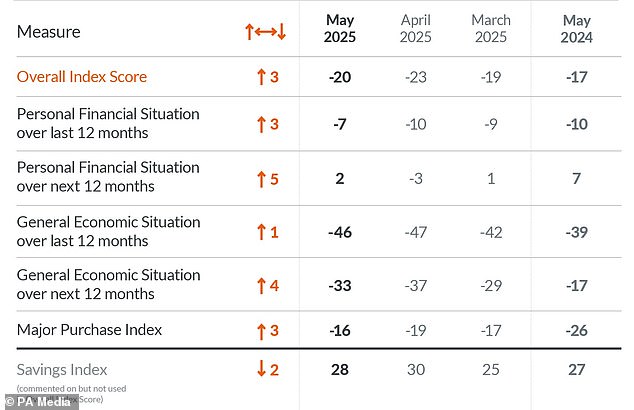- Closely-watched survey shows a brighter view on personal finances
Consumer confidence has improved amid soothing trade tensions and another base rate cut by the Bank of England.
Market researcher GfK’s latest consumer confidence index gave a total reading of -20 for May, a three-point rise on the prior month when Trump’s ‘Liberation Day’ tariff speech sparked panic about elevated inflation and slowing economic growth.
Since then, markets have calmed as Trump has agreed to suspend ‘reciprocal’ tariffs on dozens of countries and reduce taxes on Chinese goods entering the US.
The BoE has also lowered the UK’s interest rate by 0.25 percentage points to 4.25 per cent, its fourth reduction since August last year.
However, a higher-than-expected inflation reading this week means there are now concerns that interest rates are being cut ‘too rapidly’.
GfK’s survey showed higher readings across all five key indicators. The biggest monthly improvement was seen in people’s confidence about their personal finances over the coming year, which rose by 5 points to +2.

Recovery: GfK’s latest consumer confidence index gave a total reading of -20 for May, a three-point rise on the prior month
Meanwhile, consumer expectations regarding the general economic situation over the next 12 months went up by four points to -33.
And the major purchase index – a measure of consumer confidence in purchasing big-ticket items – expanded to -16, a 10-point jump on May 2024.
Neil Bellamy, consumer insights director at GfK, said: ‘Have consumers taken comfort from the Bank of England’s 8 May quarter-point base-rate cut?
‘And have they breathed a tiny sigh of relief since April when the sudden turbulence of the Trump Tariffs was prompting dire warnings of economic damage and a return to inflation?
‘Those dangers – especially the issue of inflation – have not disappeared, but the consumer mood in the UK does appear to have improved a little.’
GfK’s survey comes on the same day figures from the Office for National Statistics showed retail sales increased by 1.2 per cent in April, compared to 0.4 per cent in March.
Food store sales volumes jumped by 3.9 per cent, with supermarkets, butchers and bakers all recording strong growth thanks to warm weather and low rainfall.
At the same time, sales volumes at department stores rose by 2.8 per cent and by 2.1 per cent at household goods outlets.
Last month, companies began paying a larger National Living Wage and National Insurance contributions.
The former rose by 6.7 per cent to £12.21 per hour, while the latter changed from 13.8 per cent on annual salaries above £9,100 per year to 15 per cent on wages exceeding £5,000.
Consequently, the UK inflation rate hit a greater-than-anticipated 3.5 per cent, with a further impact from increased water, energy and council tax bills.
‘What happens to UK consumer spending from here is anyone’s guess,’ warned Charlie Huggins, head of equities at Wealth Club.
‘Higher-than-expected inflation puts pressure on disposable income and suggests interest rates won’t come down as fast as expected. Neither bodes well.
‘On the other hand, a key reason inflation remains sticky is because wages are rising strongly, which puts money directly into consumers’ pockets. This is why the Bank of England faces a very difficult task.’
DIY INVESTING PLATFORMS

AJ Bell

AJ Bell
Easy investing and ready-made portfolios

Hargreaves Lansdown

Hargreaves Lansdown
Free fund dealing and investment ideas

interactive investor

interactive investor
Flat-fee investing from £4.99 per month

InvestEngine

InvestEngine
Account and trading fee-free ETF investing
Trading 212
Trading 212
Free share dealing and no account fee
Affiliate links: If you take out a product This is Money may earn a commission. These deals are chosen by our editorial team, as we think they are worth highlighting. This does not affect our editorial independence.
This article was originally published by a www.dailymail.co.uk . Read the Original article here. .


